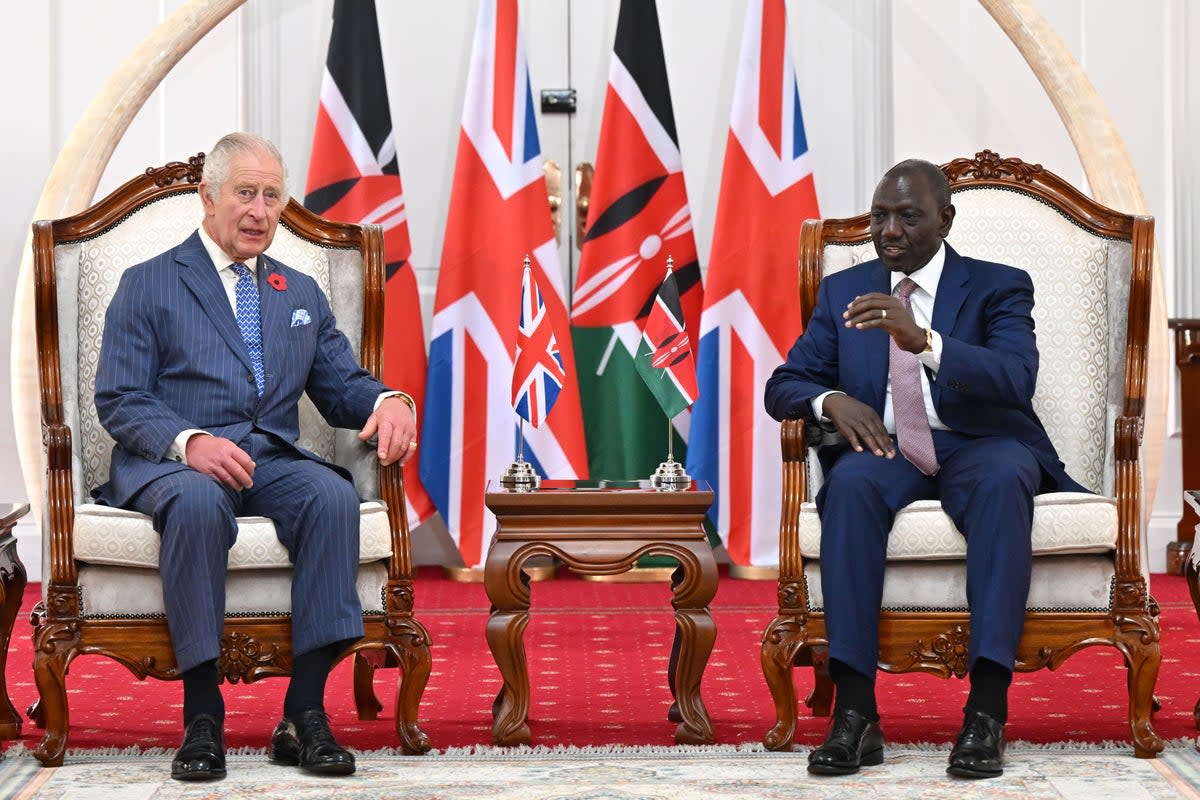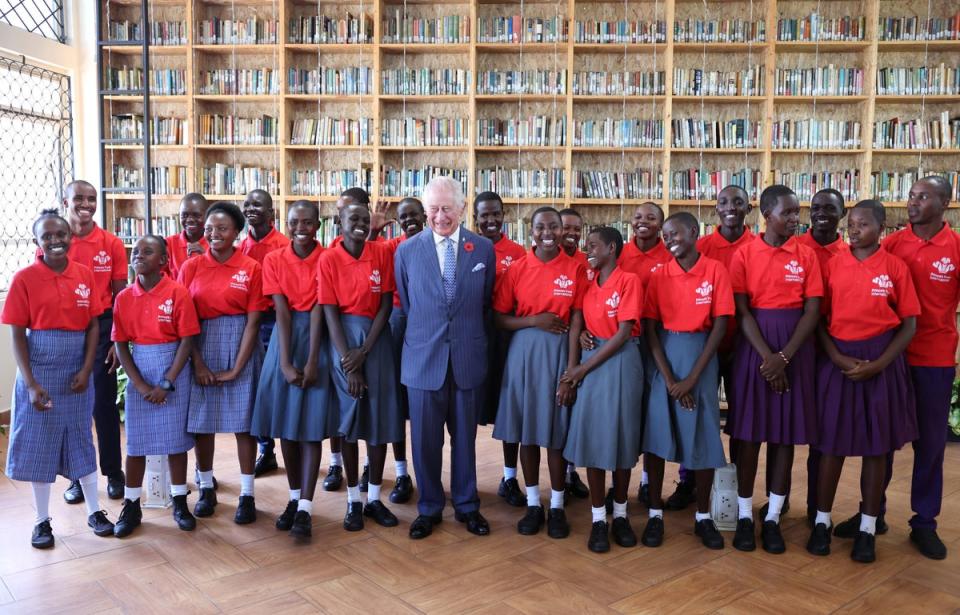King Charles arrives in Kenya for a state visit and will acknowledge ‘painful aspects’ of the past

- Oops!Something went wrong.Please try again later.
- Oops!Something went wrong.Please try again later.
- Oops!Something went wrong.Please try again later.
King Charles and Queen Camilla recieved a muted reception as they arrived in Nairobi ahead of a four-day state visit to Kenya, which threatens to be eclipsed by controversies surrounding colonial-era injustices.
Kenyan president William Ruto and first lady Rachel Ruto greeted the monarch at the State House in Nairobi on Tuesday (31 October), marking the first day of their tour of the East African nation.
The trip to Kenya is Charles’s first state visit to a Commonwealth nation as its head, since succeeding his late mother Queen Elizabeth II as Britain’s monarch last September.
According to a statement posted on the royal family’s website, the visit will “celebrate the warm relationship” between the two countries “and the strong and dynamic partnership they continue to forge”.
However, the annoucement sparked furore last month with NGOs and activists calling on Britain’s new king to “offer [a] full and unconditional apology and commit to effective reparations” to victims of human rights abuses during nearly the nearly 70 years of British colonisation.
On Sunday (29 October), the Kenya Human Rights Commission (KHRC) wrote an open letter to Charles, highlighting the atrocities committed against “Kenya’s freedom fighters” during the bloody Mau Mau uprising that led to a state of emergency being imposed in the country from 1952 until 1960.
The KHRC has said that 90,000 Kenyans were executed, tortured and maimed during the Mau Mau rebellion, led by Kikuyu fighters, with a further 160,000 people detained during the crackdown by British authorities.
According to The Telegraph, 1.2 million Kenyans were forcibly resettled during the emergency.
Buckingham Palace said the king and queen will “acknowledge the more painful aspects” of the countries’ shared history, and spend some time during the “deepening his understanding of the wrongs suffered in this period by the people of Kenya” during the trip.
Over the years, Kenya has always held a special significance to the royal family, with the country also becoming an important ally to Britain in the years post gaining independence. Queen Elizabeth II was informed of her father King George VI’s death during a visit to the country, with Prince Philip, in 1952, marking the beginning of her 70-year reign as Britain’s queen.
Then the Duke of Cambridge, William proposed to Kate Middleton during their 2011 holiday at Lewa Wildlife Conservancy near Mount Kenya, with the founder of Lewa later telling the BBC: “Kenya has always been very close to Prince William’s heart. He’s been coming here for many years. He loves it.”
Charles has visited Kenya thrice before, including in 1971 when he met the nation’s first president Jomo Kenyatta.

Now, his ongoing visit will prove a test of diplomacy and, some argue, “set the tone” for his reign, with Pulitzer Prize-winning authory and Harvard professor of history telling The Telegraph: “There is one word that he really needs to say - sorry. We are sorry.
“That is what needs to come, he needs to do that. This happened on his mother’s watch,” she added.
However, the UK high commissioner to Kenya, Neil Wigan recently explained the challenges that offering an unconditional apology in any context might present.
During a radio interview on Kenya’s Spice FM earlier this month, the British diplomat said: “An apology starts to take you to a difficult legal territory, and the settlement we made was out of court, so it showed our sincerity and openness in recognising the abuses that were committed. That is the route we chose and accepted to the Mau Mau Veterans Association.”
Wigan was referring to the 2009 Mau Mau High Court Case, brought against the British government by solicitors representing 5,000 Kenyans with claims of abuse and suffering enduring during the mutiny.
In 2013, the government settled the case out of court, agreeing to pay £19.9m in compensation to the claimants. As part of the terms of the settlement agreement, the UK also agreed to fund a memorial dedicated to the victims, now located in Nairobi’s Uhuru Gardens.
On the first day of their visit to Kenya, the Instagram account for the royal family shared a picture of Charles and Camilla standing alongside Kenya’s president and first lady, taken ahead of a “busy day of engagements”.

After bilateral meetings, they are expected to attend the State Banquet at the State House in the Kenyan national capital.
Charles’ other engagements include visiting the site of the declaration of Kenya’s independence, the Tomb of the Unknown Warrior, where they will lay a wreath. He will also head to the United Nations Office in Nairobi to learn about its environment programmes and attend a technology showcase to celebrate the Kenyan entrepreneurs propelling the country’s tech industry.
Meanwhile, Camilla on Tuesday travelled to the Eastlands Library in Nairobi, where she met the founders of Book Bunk – a charity that works to restore the country’s public libraries – and is expected to join Charles for their tour of a new museum dedicated to Kenya’s history.

